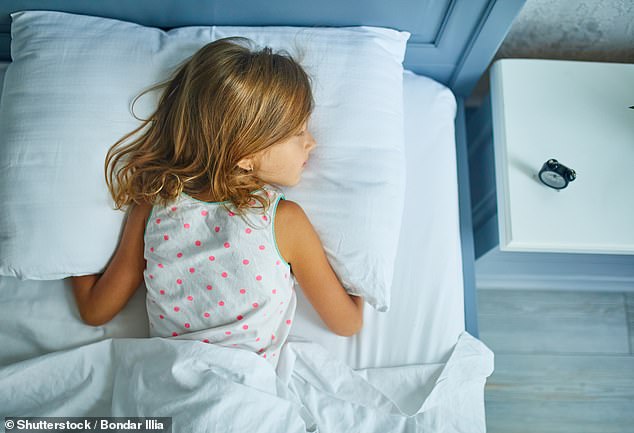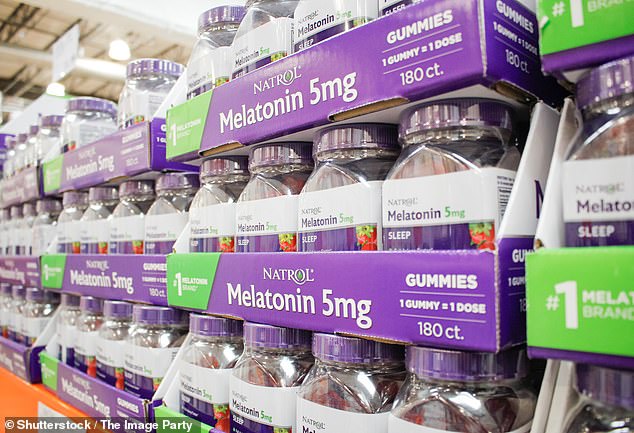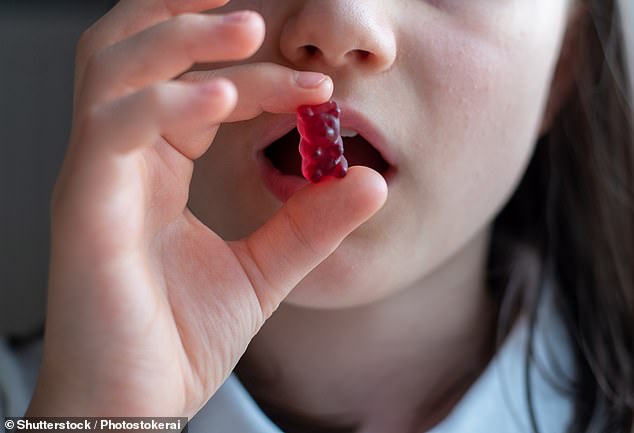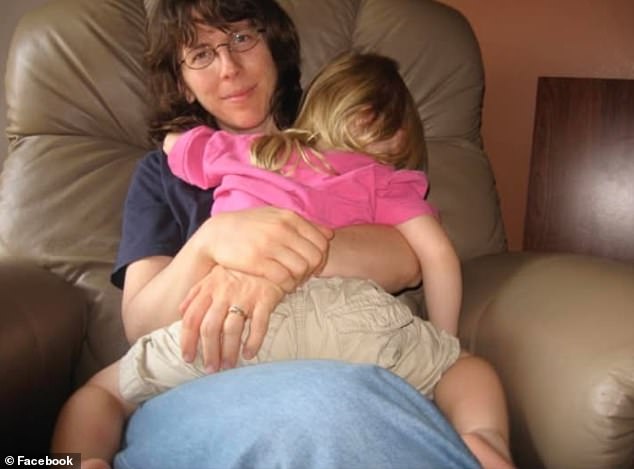
Doctors expose the truth about melatonin… as terrifying side effects soar
Health experts have issued a warning about the ‘terrifying’ rise of melatonin use among children, which they say could lead to fatal overdoses.
Melatonin is a hormone naturally produced by the pineal gland in the brain. It helps regulate the body’s sleep-wake cycle (circadian rhythm). Melatonin levels rise in the evening, promoting drowsiness, and fall in the morning, promoting wakefulness.
The supplement is heavily regulated as a prescription-only medication in many parts of the world, including the UK, the EU and Australia. But in the US, the FDA regulates it as an over-the-counter option.
More than 67 million Americans take melatonin, and analysts predict sales of the supplement will top $588 million in 2025, up from $339 million in 2017.
But as adults turn to the hormone in droves to help kick insomnia, children are also being introduced to it, either intentionally by parents to aid fussy sleepers or by mistaking appetizing-looking melatonin gummies for a sweet treat.
A 2023 study by the American Academy of Sleep Medicine found that almost half (46 percent) of parents have given melatonin to a child under the age of 13 to help them fall asleep.
And in 2022, the CDC revealed how, in the decade leading up to 2021, poison helplines dealt with 260,435 calls about children who had taken too much melatonin, a 530 percent increase from 2012.
In 2012, melatonin was responsible for one percent of pediatric poisonings. That rose to five percent in 2021.
Health experts are warning about the ‘terrifying’ rise of melatonin addiction and overdoses among children in the US, with little known about the long-term consequences of taking the sleep aid (Stock image)
Of the poison reports, two children died, five were put on a ventilator to help them breathe, nearly 300 ended up in intensive care and more than 4,000 were hospitalized.
Melatonin is naturally produced in the brain’s pineal gland, and its release into the body is controlled by light.
During the day, melatonin levels in the body are low and we feel awake, but when the sun sets, more melatonin circulates in the body, preparing people for sleep.
Melatonin may be suggested to adults to help them fall or stay asleep, but the substance is generally not recommended for children without medical guidance because little is known about its long-term impacts.
Dr Keith Vossel, a neurologist at the University Of California Los Angeles, told the Daily Mail he would not recommend giving children melatonin as it is a hormone and ‘could have effects on the timing of puberty, metabolism and immune system.’
Studies have shown a link between melatonin intake and delayed puberty, as well as an affect on related hormonal pathways.
This is because melatonin interacts with the hypothalamic-pituitary-gonadal (HPG) axis – the hormonal system that controls puberty – so ‘we need to be cautious and longer-term studies are needed,’ Vossel said.
Like Vossel, Dr Rachel Toles, a clinical psychologist in California, told the Daily Mail she is concerned about the melatonin abuse among both adults and children.
‘Melatonin should never be the first solution for children’s sleep,’ she said. ‘It’s a hormone, not a harmless vitamin, and the long-term effects on developing brains are still unknown.
‘The big issue is that the supplements look like candy and they are often left within children’s reach.
‘Some parents also give melatonin to their kids too freely, and it has become a cultural quick fix for sleep, which is concerning.’
Along with having a possible impact on puberty, Toles said it can negatively affect the metabolism and immune systems.
Melatonin can negatively affect metabolism by disrupting glucose regulation and weight balance when misused, and may impair immune function by suppressing necessary inflammatory responses if overused.
Taking melatonin at the wrong time can disrupt insulin release and circadian control of glucose, leading to poor blood sugar control and weight gain.
Meanwhile, excess melatonin can overly suppress pro-inflammatory signals, weakening necessary immune responses to infection.
Toles said that parents should also be aware that melatonin ‘can cause grogginess, headaches and even more wakefulness at higher doses.’
‘The real danger is using it to mask bigger issues like screen time, anxiety or inconsistent routines,’ she added.
There is also the possibility of children getting hooked on the supplement and their sleep getting worse in the long run.

A typical dose for melatonin ranges from one to 3mg, taken about 30 minutes before bedtime, with most people rarely needing more than 5mg (Pictured: melatonin gummies on a store shelf)
On Reddit, dozens of parents have revealed horror stories involving melatonin and their children.
One mother revealed that she gives her son, who has autism and ADHD, one milligram of melatonin when on vacation.
A typical adult dose for melatonin ranges from one milligram to 3mg, taken about 30 minutes before bedtime, with most people rarely needing more than 5mg.
The recommended dose for young children is significantly lower (for three- to five-year-olds the dose is suggested not to exceed one milligram), and this amount can lead to a range of moderate to severe symptoms such as drowsiness, dizziness, headaches, nausea and agitation.
The mother said she accidentally left the bottle of gummies in her two-year-old daughter’s room, and the infant ended up taking in 26mg.
Ingesting 26mg of melatonin is a serious overdose for a toddler and requires immediate medical attention.
The mother said she called poison control and they told her to monitor her daughter at home but to visit the ER if any symptoms worsened.

A CDC report released in early 2022 revealed that in the decade leading up to 2021, poison helplines dealt with 260,435 calls about children who had taken too much melatonin (Stock image)
On Facebook, Beth McCarty from Vancouver revealed her 11-year-old son, Ethan, took 18 melatonin gummies as he had watched his father take large doses of medication.
Sharing photos of Ethan looking drowsy in the back of an ambulance, she wrote: ‘So deeply thankful for the medics [and] poison control who responded after Ethan was literally laied [sic] out and plastered to the living room rug. They were all so calm with us and our boy.
‘Parents, WATCH your kiddos with ANY med. Ethan sure knows never to try anything like this again.’
In another post, Iowa-based mental health coach Marci Hanzelka McKinnon shared how she unknowingly got her son hooked on melatonin.
As a warning to other parents, she wrote: ‘Yep, we are guilty. We gave our son melatonin.
‘No one knew (or no one told us) back then the dangers of using melatonin for our child.
‘At that time the highest dose was 10mg; that was considered extremely high. We started him at 3mg and slowly kept moving it up because it stopped working.

Iowa-based mental health coach Marci Hanzelka McKinnon (pictured) shared how she unknowingly got her son hooked on melatonin
‘Eventually we reached 10mg. Once that stopped working we stopped giving it to him and were no better off than we were before we started using it.
‘Today, you can get 50mg of melatonin! That’s unbelievable! And so dangerous!’
All of the doctors the Daily Mail spoke to agreed that sleep has become harder for children in the modern world with increased exposure to technology and busier schedules.
Still, they all advised against melatonin as a solution.
Los Angeles-based Dr Raj Dasgupta, the chief medical advisor for Sleepopolis, said the best thing to do before turning to sleep aids is to figure out why the child isn’t sleeping first.
‘Sometimes it’s as simple as bedtime habits or anxiety,’ he told the Daily Mail. ‘I usually tell parents to exhaust all behavioral approaches before reaching for medication or supplements.’
And Dr David Sinclair, a professor at Harvard Medical School, said that ‘Natural alternatives are best’ for addressing sleep issues.
‘[Try] consistent bedtime routines, dimming lights in the evening and keeping screens out of the bedroom, and making sure kids get enough daylight and physical activity during the day,’ he told the Daily Mail.
‘I have seen cases where children were put on melatonin for sleep and it helped in the short term.
‘But in most situations, once children get exercise, nighttime lights are dimmed and devices are taken away before bedtime, they didn’t need the supplement anymore.’
First Appeared on
Source link






